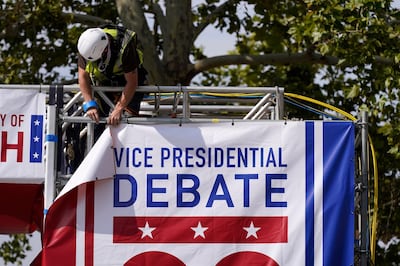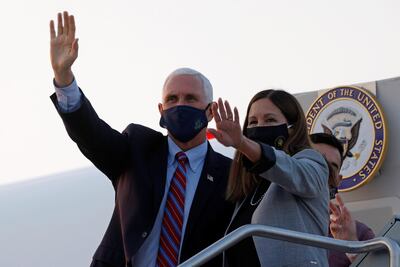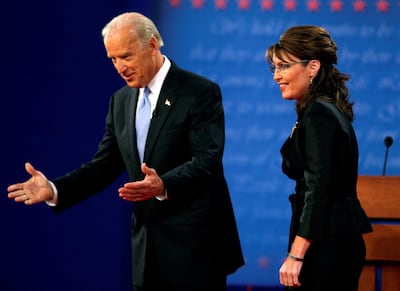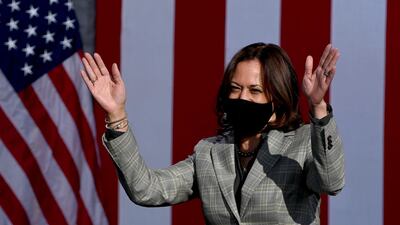In normal times, a vice-presidential debate doesn’t rank high on the roster of set-piece events that define the closing weeks of a US presidential election. But these are not normal times. The Wednesday night face-off in Utah between Mike Pence and Kamala Harris could be the most important vice-presidential debate since 1976, when the exchange was first enshrined as an election-year fixture.
President Donald Trump has contracted Covid-19, which means the spotlight is on his deputy as the person next in line to assume power, if required. And at 77, Mr Trump's Democratic challenger Joe Biden is in the high-risk category for complications were he to be infected by coronavirus. Accordingly, the political positions and instincts of Ms Harris, Mr Biden's vice-presidential pick, assume greater importance than usually given to the second-rung candidate on the ballot.
Add to that the backlash from the first US presidential debate on September 29. It was neither presidential nor really a debate, with Mr Trump assuming an aggressively disruptive posture that his admirers have described as "gladiatorial". Mr Trump's subsequent illness has left a question mark on the two remaining presidential debates scheduled for this month.
In the circumstances, the 90-minute conversation between Mr Pence and Ms Harris may prove to be the more consequential and enlightening exchange on the substantive issues that face the US and the world than any presidential debate this year.
In fact, it may be the last – and perhaps the only – time that the American electorate and much of the planet gets to hear top-flight American politicians credibly represent their parties' contrasting views on governance, economics, trade, foreign policy, social justice, the pandemic, health care, climate change and the culture wars.
In a sense, this will be a mainstream Democrat speaking to a mainstream Republican without the distracting acerbic charge provided by Mr Trump as he lays into Mr Biden. As a respected Republican lobbyist put it, “the undercard is going to be the crisp, textbook political debate you'd expect at the president level while the championship bout is going to be a war of rhetorical attrition".
Finally, of course, the debate bears the weight of historical significance. It will be only the third time that a woman is centre-stage and auditioning for a job that puts her, as the cliche goes, a heartbeat away from the presidency. Ms Harris follows in the sprightly wake of 1984 Democratic vice-presidential nominee Geraldine Ferraro and the somewhat mediocre performance turned in by the 2008 Republican pick Sarah Palin.

Whoever wins the 2020 debate, it is reasonable to expect the encounter will reflect some of the advances American women have made in the 36 years since Ferraro debated George HW Bush.
Ms Harris, a California senator and sharp prosecutor, is unlikely to suffer the predicament of the late Ferraro, also a lawyer and a member of Congress. Bush continually referred to her as “Mrs Ferraro” rather than by her job title of “Congresswoman” and offered to help her understand the nuances of international diplomacy, especially “the difference…between Iran and the embassy in Lebanon". At the time, Ferraro responded with a mild admonition of Bush’s “patronising attitude that he has to teach me about foreign policy".
In the age of the #MeToo movement and the campaign for greater inclusiveness across gender and racial divides, it is hard to imagine even so conservative and religious a politician as Mr Pence daring to deal with Ms Harris in the same way. It is worth noting, as an aside, that Ms Harris will not have the privilege accorded by Mr Biden to Ms Palin in their debate – of standing rather than sitting during the session. Mr Biden agreed to Ms Palin's request that both candidates stand throughout. But the Trump campaign prefers to have them seated, a point that observers describe as outrageous in light of the pandemic.

But whether they stand or sit across from each other, debates between vice-presidential nominees can be as much a measure of social change as a handy baseline view of political perspective minus the personal animosity that comes with the contest for the top job. Generally though, they play, like their principals, second fiddle to the contenders for the White House. Mr Trump once made clear where Mr Pence stands – behind him and in the shadows. "I will say this, people don't vote for the vice,” he told a radio show in August. “People don't vote for the vice president, they really don't."
It is true that American voters care about the top of the ticket and their limited attention to debates between the deputies reflects that reality. Vice-presidential debates mostly attract about one-third of the television viewership accorded to a presidential face-off. In 2016, for instance, just 37 million people watched the debate between Mr Pence, then governor of Indiana and Mr Trump's vice-presidential nominee, and Hillary Clinton's pick, Senator Tim Kaine. That was 44 per cent less than the viewership of the lowest-rated Trump-Clinton presidential debate, which drew 66.5 million viewers.

The only time a vice-presidential debate scored big was in 2008, when nearly 70 million people tuned in to watch Ms Palin versus then senator Biden. More people watched Biden-Palin than any of the three debates between the 2008 presidential hopefuls, senators Barack Obama and John McCain. The reason was thought to be Ms Palin’s avowed status as a fearless culture warrior, albeit with a shaky grasp of the logic and facts upon which she rested her case.
It is possible that the unique circumstances of this pandemic year – and the septuagenarian presidential candidates – may drive extraordinary interest in the Pence-Harris debate. It certainly promises to be an assured performance on either side because Mr Pence is a silver-tongued former radio talk show host and Ms Harris a formidably forensic trial lawyer.
Each faces significant challenges. Ms Harris will have to convince enough Americans that she and Mr Biden are centrists and not in hock to the "radical left" as they are painted by Mr Pence and Mr Trump. For Mr Pence, the case is arguably harder. At a hellish moment for America, he has to assure redemption but without any progressive change.
Rashmee Roshan Lall is a columnist for The National


